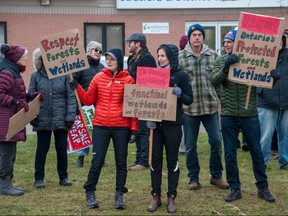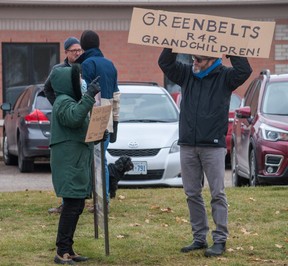A controversial Ontario housing bill critics are slamming for being too developer-friendly sparked a rally in Stratford on Friday that brought several dozen demonstrators to the office of Perth-Wellington MPP Matthew Rae.

A controversial Ontario housing bill critics are slamming for being too developer-friendly sparked a rally in Stratford on Friday that brought several dozen demonstrators to the office of Perth-Wellington MPP Matthew Rae.
Roughly 100 people from Stratford and other parts of Southwestern Ontario attended the hour-long protest organized by a group of local environmental advocates representing the Perth County Sustainability Hub. Demonstrators waved signs condemning the Ford government’s recent efforts to unlock large swaths of the province’s Greenbelt for development, targeting in particular Bill 23, the More Homes Built Faster Act.

“This legislation is suddenly going to give (developers) this incredible windfall, and they’re all donors and supporters of (Premier) Doug Ford,” said Uku Vastopa, one of the protesters at the rally, adding the demonstration is also about the “legacy” advocates are attempting to leave for future generations. “This is so we don’t have to bring asparagus from South Africa and fruits from Chile. This is about sustainability; it’s about protecting our water and climate resilience.”
Housing Minister Steve Clark unveiled Bill 23 last month as part of the Tory government’s plan to tackle a widespread housing shortage by building 1.5-million homes over the next decade. The bill includes around 50 measures that follow through on the government’s housing commitments by “cutting delays and red tape,” Clark said at the time.
The government’s plans to reduce government fees and shorten development approval processes – as well as backtrack on promises not to allow development in the Greenbelt – have since drawn the ire of critics on a number of fronts, however, including many in the province’s farming community.
Sunil Puri is a member of National Farmers Union – Ontario. In a speech to protesters in Stratford on Friday, he described Bill 23 as a threat to Ontario’s farmland, natural heritage systems and the democratic planning process.
“The government wants to build more houses because our population is growing but, if you build those houses on our farmland, we’re not going to be able to feed the population that we’re housing,” he said in an interview with the BeaconHerald. “We’ve got to take a more holistic approach there, figure out a way to use gentle densities … to house folks without compromising our ability to feed them.”

Opening up agricultural lands to development is leading to real estate speculation that’s keeping young farmers priced out of the industry, added Puri, a 29-year-old farmer who rents three plots of land near his home in Ancaster.
“If I’m to buy farmland in my lifetime, I won’t be able to do it around Hamilton or anywhere close to the (Greater Toronto Area),” he said. “The speculation that these proposals is opening up, it’s making it so farmland is no longer a viable purchase for existing farmers or new farmers.”
The speed at which Bill 23 is moving through the legislature is also a concern.
“We feel like this bill has been pushed through way too quickly, and there hasn’t been genuine public consultation or time for analysis,” Puri said. “They’re not taking into any consideration what the public is saying and that’s just egregious in our view.”
Ford’s PC government offered a number of changes to Bill 23 earlier this week. They included backpedalling on a proposal that would have banned third-party groups from submitting development appeals to the Ontario Land Tribunal.
Those changes haven’t satisfied the bill’s opponents.
According to advocates Environmental Defence, at least five other protests were scheduled Friday, with another 12 scheduled to take place across the province over the weekend. That group has decried Bill 23 and its policy proposals as “an attack on conservation authorities, woodlands, and provincially significant wetlands that aims to enable destruction of wetland habitats and conservation lands.”
Besides environmental leaders, many Ontario cities are pushing back as well on proposals that seem to transfer the cost of building from developers to municipal taxpayers.
In London this week, senior bureaucrats warned the city could face a $97-million cash crunch, carving a huge hole in city budgets over the next five years, if Bill 23 becomes law. Officials in Ottawa came to a similar conclusion earlier this month.
In a review for The Conversationtwo associate professors at the University of Waterloo’s school of planning – Michael Drescher and Luna Khirfan – also raised concerns about the measures in Bill 23 that prevent conservation authorities and protecting from the environment.
“While the housing crisis clearly needs to be addressed, Bill 23 proposes to solve one crisis (housing) at the expense of another (climate change),” they wrote. “Despite the bill’s positive components, the removal of many environmental regulations will saddle future homeowners with the costs of having to upgrade and repair their houses when their properties get flooded or when it turns out that their land doesn’t have trees and other plants that help protect against increasing urban heat.”

Sharon Collingwood, one of the organizers responsible for Friday’s rally in Stratford, said she was “just so chuffed” to see people join in from London, Kitchener, Goderich, Bayfield and other communities in Southwestern Ontario.
“It was a great turnout,” she said.
But she isn’t yet confident advocates have been loud enough to prevent the legislation from being passed.
“I think this is the beginning of a big battle,” she said. “Now is the time to get out and do something about it because there won’t be another one.”
